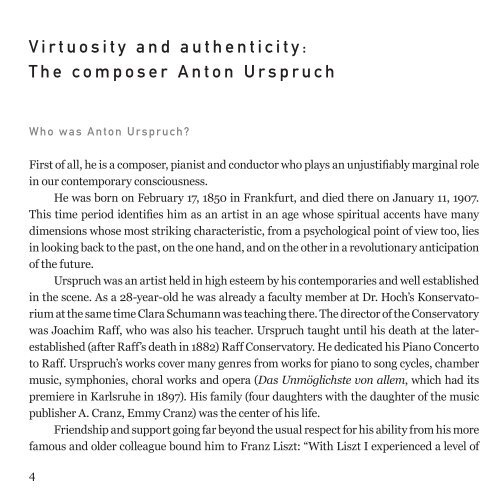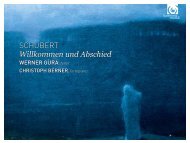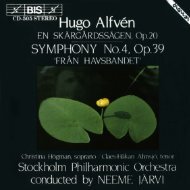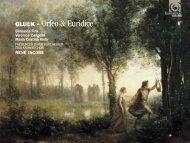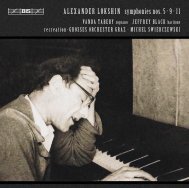Anton Urspruch (1850–1907) Complete Works for Piano ... - eClassical
Anton Urspruch (1850–1907) Complete Works for Piano ... - eClassical
Anton Urspruch (1850–1907) Complete Works for Piano ... - eClassical
Create successful ePaper yourself
Turn your PDF publications into a flip-book with our unique Google optimized e-Paper software.
Virtuosity and authenticity:<br />
The composer <strong>Anton</strong> <strong>Urspruch</strong><br />
Who was <strong>Anton</strong> <strong>Urspruch</strong>?<br />
First of all, he is a composer, pianist and conductor who plays an unjustifiably marginal role<br />
in our contemporary consciousness.<br />
He was born on February 17, 1850 in Frankfurt, and died there on January 11, 1907.<br />
This time period identifies him as an artist in an age whose spiritual accents have many<br />
dimensions whose most striking characteristic, from a psychological point of view too, lies<br />
in looking back to the past, on the one hand, and on the other in a revolutionary anticipation<br />
of the future.<br />
<strong>Urspruch</strong> was an artist held in high esteem by his contemporaries and well established<br />
in the scene. As a 28-year-old he was already a faculty member at Dr. Hoch’s Konservatorium<br />
at the same time Clara Schumann was teaching there. The director of the Conservatory<br />
was Joachim Raff, who was also his teacher. <strong>Urspruch</strong> taught until his death at the laterestablished<br />
(after Raff’s death in 1882) Raff Conservatory. He dedicated his <strong>Piano</strong> Concerto<br />
to Raff. <strong>Urspruch</strong>’s works cover many genres from works <strong>for</strong> piano to song cycles, chamber<br />
music, symphonies, choral works and opera (Das Unmöglichste von allem, which had its<br />
premiere in Karlsruhe in 1897). His family (four daughters with the daughter of the music<br />
publisher A. Cranz, Emmy Cranz) was the center of his life.<br />
Friendship and support going far beyond the usual respect <strong>for</strong> his ability from his more<br />
famous and older colleague bound him to Franz Liszt: “With Liszt I experienced a level of<br />
4


